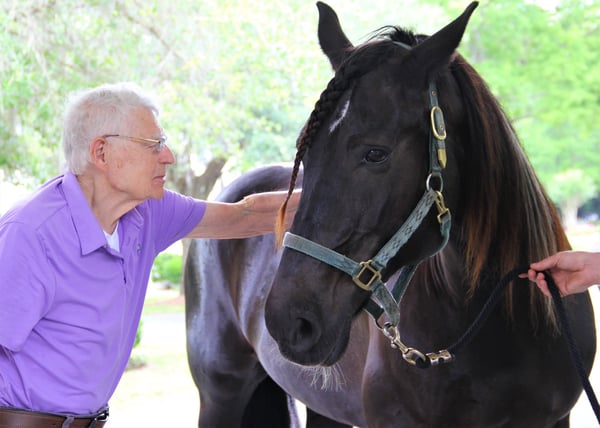Download our Free Guide:
Senior Living Explained
Learn what different types of senior living care are available and which one best fits your needs now and in the future.

.jpg)

Pet therapy, formally known as animal-assisted therapy (AAT), is known to provide both physical and mental benefits for seniors with dementia. Prior to COVID-19 concerns, many Memory Care facilities around the country had adopted pet programs of some kind. Some chose to bring in animals as full-time residents, others chose visiting pet programs.
All types of senior living communities are including pets to make their communities feel homier and offer a special kind of comfort and stimulation for residents. However, AAT can be especially beneficial for those suffering from mild or more advanced memory loss.
 What Is Animal Therapy?
What Is Animal Therapy?
It is the interaction between specially-trained animals and individuals or groups, with a goal of achieving both calming and stimulating effects. The therapy can be delivered in structured sessions, or pets can provide an ongoing presence.
Endorphins, serotonin, and dopamine – oh my!
Pets are fun. Therapy-trained pets are assuredly friendly and non-threatening. They offer unconditional love, taking people as they are without judgment or criticism – something that can be especially valuable for dementia patients.
Animal-assisted therapy programs enable seniors to pet animals, hold them, play with them, or simply sit and watch them. Petting, tossing a ball, and walking animals provides a mild sort of physical activity. But even without that, the effect is calming. For seniors with dementia, this can help alleviate troublesome symptoms such as anxiety, depression, agitation, irritability, and loneliness.
 Animal therapy can help lower blood pressure, improve cardiovascular health, and reduce the need for certain medications. Plus, the increased mental stimulation helps improve social skills and memory recall.
Animal therapy can help lower blood pressure, improve cardiovascular health, and reduce the need for certain medications. Plus, the increased mental stimulation helps improve social skills and memory recall.
Some researchers say pet therapy can help reduce “sundown syndrome” among dementia patients. On the other hand, a study that followed Alzheimer’s patients after a dog was brought in as a full-time resident shows marked behavioral improvement during the day, but not much change in the evenings. Studies continue.
Popular Pets for Therapeutic Assistance
Dogs and cats immediately come to mind when we think of pets, but AAT professionals say rabbits, birds, and horses also make great animal therapists - and fish.
Though not available for hands-on petting or cuddling, it turns out that aquariums can offer real therapeutic value. Watching them is so relaxing, it can be almost mesmerizing. In one study, seniors also experienced noticeable and ongoing appetite improvement after an aquarium was introduced into their environment. (The report didn’t mention if the seniors wanted to eat more fish, or simply more food.)
Animal therapists are getting creative, too. Robots that look like animals show promise as alternatives for seniors who are allergic to dogs or cats. Robots don’t require food, clean-up, or veterinary care, and they don’t bite or spread infection. Stuffed animals may also offer some benefits when live pets are not available.
 Do Try This at Home
Do Try This at Home
Animal therapy isn’t only for residents of senior living facilities. If you are caring at home for a loved one who has been diagnosed with Alzheimer’s or another type of dementia, pets are something to consider if you don’t already have one. Whether or not your Mom is able to participate in the care and feeding of a pet, the animal’s presence (again even an aquarium with a few colorful fish) can provide the same gentle physical stimulation, mental engagement, and emotional soothing.
Everyone Benefits
Anecdotal reports indicate that caregivers – family members and friends at home, and staff within Memory Care facilities – also enjoy the stress-reducing and uplifting benefits of pet therapy. As we look forward to the day when we can all get together again in person, we at Magnolia Manor look forward to re-introducing animal therapy opportunities for our Memory Care and other residents.
Curious about the different types of senior living care offered at Magnolia Manor? We're here to help answer any questions you may have. Contact us at 855-540-5433 to get more info and schedule a tour.
Learn what different types of senior living care are available and which one best fits your needs now and in the future.
